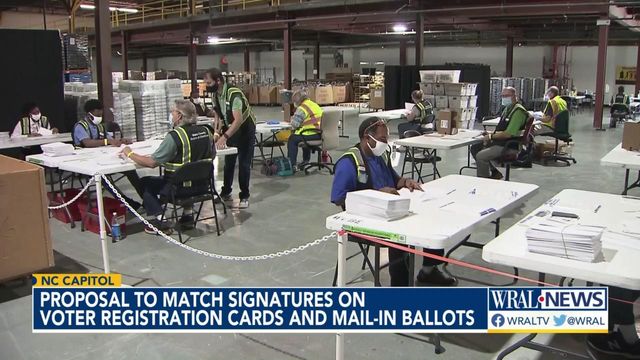NC absentee ballot signatures won't face new scrutiny, elections board rules
The North Carolina GOP sought to allow county boards of elections to compare questionable signatures on absentee ballot request forms, citing concerns over voter fraud. The Democrat-controlled state elections board denied the request, saying there are plenty of safeguards in place.
Posted — UpdatedElections officials in North Carolina won’t be authorized to compare signatures on absentee ballot requests to other signatures on file, state elections board members ruled Thursday.
The Republican Party of North Carolina had asked the North Carolina State Board of Elections to make what’s called a “declaratory ruling” on whether county elections boards could compare signatures on absentee ballots and request forms with other signatures on file. Granting that permission, Republicans say, would strengthen elections oversight and reduce the potential for voter fraud.
Karen Brinson Bell, the board’s executive director, has instructed county boards not to compare them. Doing so, she says, would go beyond what state law requires. The elections board, which is made up of three Democrats and two Republicans, supported Bell’s interpretation of the law and voted 3-2 along party lines to deny the GOP’s request.
The ruling sets the stage for a potential legal battle; the state GOP said in its petition that the decision would be subject to legal review. And the decision comes as Republicans push for new elections rules across the nation and as some of its leaders, including former President Donald Trump, continue to cast doubt on the legitimacy of the 2020 elections.
The Republicans’ petition in North Carolina said state elections officials can’t confidently say that all valid votes have been counted accurately if they aren’t authorized to match signatures. State elections officials, however, have said that there is no evidence of widespread absentee voter impersonation efforts that would tip the scales in an election.
Democrats on the board argued Thursday that the voting process is already secure, adding that a signature-matching system might not be uniformly enforced across the state. They also said subjectivity involved in matching signatures could disqualify valid ballots.
“We've got an extraordinarily secure absentee ballot process now and to do this would introduce a level of uncertainty wherein some voters might be treated [differently] than other voters depending on how they vote,” said Board Chairman Damon Circosta, a Democrat.
Circosta is also head of the A.J. Fletcher Foundation, which was started by the founder of Capitol Broadcasting Co., which owns WRAL. Capitol Broadcasting leadership sits on the foundation board.
Inconsistencies in signatures could also arise due to the state’s voting process. Voters who request an absentee ballot online often have to use their finger, a stylus or a mouse to replicate their signature on screen.
Michael Whatley, chairman of the North Carolina Republican Party, said after the ruling that the party was stunned by the decision that "neutered" county elections workers' ability to mitigate potential fraud.
"This misguided decision is a direct contradiction of state law, which is clear that county boards of elections are required to validate the identity of absentee voters," Whatley said in a written statement. "The North Carolina Republican Party will explore every option at our disposal to restore voter signature verification as an essential component of our county boards' efforts to protect the integrity of North Carolina elections.”
Common Cause North Carolina and Democracy North Carolina, left-leaning voters rights advocacy groups, applauded the board's decision.
The state already requires absentee ballots to be signed by two witnesses or a notary. State law also says the request forms and the return envelopes must be signed, but it doesn't say elections officials have to compare them.
Republican board member Stacy Eggers believes that allowing signature comparisons would build trust in North Carolina’s elections system.
“Our weakest point in elections is the return of absentee ballots,” Eggers said. He suggested that a system that evaluates suspicious signatures on the front end of the voting process would save time and resources currently tied up in ballot challenges after votes are cast.
Republican board member Tommy Tucker agreed, saying he reviewed absentee ballots cast in Union County in 2020 and noticed a number of “illegible” signatures. He said 20 county boards are ready to begin doing signature checks on absentee ballots.
“These are the ballots that we're talking about that should be reviewed and can be reviewed,” Tucker said. “The lack of accountability through the absentee ballot process lends itself to the opportunity to cheat.”
Democratic board member Stella Anderson said that letting county boards decide on whether to compare signatures raises "equal-protection and due-process issues for voters.” Some counties may choose to enforce signature-checks, while others might not, creating inconsistencies in enforcement. Anderson said the Republicans’ proposal could threaten “equal treatment of voters who are duly registered and lawfully voting.”
Related Topics
Copyright 2024 by Capitol Broadcasting Company. All rights reserved. This material may not be published, broadcast, rewritten or redistributed.





